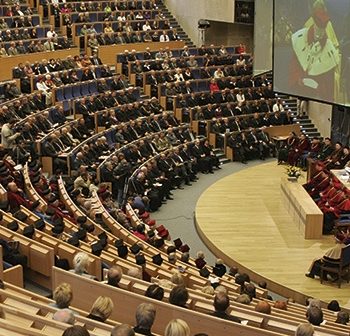The scientific community in Małopolska, with Kraków, of course, playing the leading role, is second only to Warsaw in terms of teaching potential and scientific research in Poland. More than 20,000 university lecturers (including 1,800 professors) educate almost 10 percent of the Polish student population. Every year 45,000 graduates enter the labour market. In recent years, that is since Poland’s accession to the European Union in 2004, the scientific community has been able to participate in competing for EU scientific funding. Indeed, Polish scientists have demonstrated many times that this is something at which they are particularly successful, winning grants for both research and equipment.
Until recently, a weakness of the scientific community in Kraków was its detachment from the real needs of the economy, something which can be put down to its past, namely the pre-1989 political era. This is, however, changing rapidly. Local universities, regardless of their specialisms, are working not only with Polish companies, but also with global corporations, as the latter quickly realized that the universities in Kraków have a very high standard of education. The fact that Motorola’s programming centre has been in Kraków for several years now, as well as the fact that Delphi’s technical centre is also within the city are good examples of the conclusions drawn. Subsequently many similar ventures have appeared in the city, some of which are located on the Kraków Technology Park – a special economic zone. This is especially noticeable with regard to the IT industry and financial services.
The ‘fever’ created by the information that there are vast resources of shale gas in Poland has resulted in even greater cooperation between the energy and exploration companies and the AGH University of Science and Technology. Hoping for, among other things, well-educated staff, the companies have equipped the university with the necessary modern apparatus and specialized software.
With the help of both state and local initiatives in recent years, the scientific infrastructure in the city has without doubt developed considerably. The best example is the recent development on the Jagiellonian University campus, where the ultra-modern buildings are to house all the natural science faculties of the university.
Additionally, the universities have acquired some of the most up-to-date equipment, to be used by scientists from many disparate fields, such as the electron microscope which has recently been installed at the AGH University of Science and Technology and which is one of the best in Europe, or the synchrotron centre built under the auspices of the Jagiellonian University.
The scientific community, together with the authorities of the region, has also drawn its own conclusions from the fact that the twenty-first century will be the century of life sciences. This is why a very modern centre for biotechnology is being built in Kraków. It will provide excellent conditions for conducting research at the highest levels as well as the opportunity to convert the results into business ventures.
Science in Kraków, with its constantly improving scientific resources, is in a phase of rapid growth. Its representatives are becoming more and more effective in the world of modern science and certainly the city is developing a name not only for its traditional strengths but also for its intellectual potential.
Until recently, a weakness of the scientific community in Kraków was its detachment from the real needs of the economy, something which can be put down to its past, namely the pre-1989 political era. This is, however, changing rapidly. Local universities, regardless of their specialisms, are working not only with Polish companies, but also with global corporations, as the latter quickly realized that the universities in Kraków have a very high standard of education. The fact that Motorola’s programming centre has been in Kraków for several years now, as well as the fact that Delphi’s technical centre is also within the city are good examples of the conclusions drawn. Subsequently many similar ventures have appeared in the city, some of which are located on the Kraków Technology Park – a special economic zone. This is especially noticeable with regard to the IT industry and financial services.
The ‘fever’ created by the information that there are vast resources of shale gas in Poland has resulted in even greater cooperation between the energy and exploration companies and the AGH University of Science and Technology. Hoping for, among other things, well-educated staff, the companies have equipped the university with the necessary modern apparatus and specialized software.
With the help of both state and local initiatives in recent years, the scientific infrastructure in the city has without doubt developed considerably. The best example is the recent development on the Jagiellonian University campus, where the ultra-modern buildings are to house all the natural science faculties of the university.
Additionally, the universities have acquired some of the most up-to-date equipment, to be used by scientists from many disparate fields, such as the electron microscope which has recently been installed at the AGH University of Science and Technology and which is one of the best in Europe, or the synchrotron centre built under the auspices of the Jagiellonian University.
The scientific community, together with the authorities of the region, has also drawn its own conclusions from the fact that the twenty-first century will be the century of life sciences. This is why a very modern centre for biotechnology is being built in Kraków. It will provide excellent conditions for conducting research at the highest levels as well as the opportunity to convert the results into business ventures.
Science in Kraków, with its constantly improving scientific resources, is in a phase of rapid growth. Its representatives are becoming more and more effective in the world of modern science and certainly the city is developing a name not only for its traditional strengths but also for its intellectual potential.








